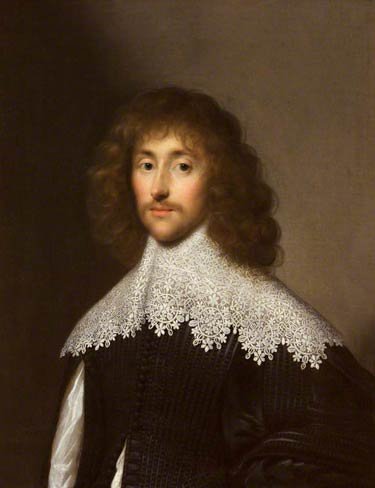“Out of It Ere Night”
Hobey Baker, Jeffrey Hart, The American Gentleman, The Gentleman, Viscount Falkland

Lucius Cary, 2nd Viscount Falkland (c. 1610 – 20 September 1643)
Jeffrey Hart, in the New Criterion, remembers the now-approximately-extinct ideal of the English, and the later American, Gentleman, as embodied in the lives and characters of Lucius Cary, 2nd Viscount Falkland, Princeton’s Hobey Baker, and the Post-WWII “wise men” of American Liberalism: Dean Acheson, Charles “Chip†Bohlen, John J. McCloy, George Kennan, and Averell Harriman.
On the morning of September 20, 1643, Lucius Cary, Viscount Falkland, died at age thirty-three in cavalry action before the town of Newbury. A scholar and poet, an intimate of Ben Jonson, Thomas Hobbes, John Selden, Clarendon, and Davenant, he em bodied in many ways the ideal of his period. His was not an absolutely first-rate mind, like those of Hobbes or Selden. They were, to put it one way, too surpassingly intelligent to be representative of anything. But Falkland did embody an ideal. He was an English gentleman as his era understood the idea. He was a man of great moderation, and in the House of Commons he often supported the reformers. He distrusted the power and arrogance of men like Bishop Laud. He had a broad definition of the Church of England, and held to reason and religious toleration. But he grew increasingly frightened by men like Cromwell, Hampden, and Pym. When revolution and civil war loomed imminent, Falkland stood with the King as advisor and cavalry officer.
His superlative personal qualities grew in his own eyes increasingly irrelevant to the history that unfolded before him. The air of England reeked of cannon smoke, and her soil was drenched in blood. The King was duplicitous and a victim of bad advice. The long afternoons of discourse at Great Tew, the Falkland family estate in Oxfordshire, might as well have been on another planet. Falkland’s philosophical and platonic friend Lady Sophia Murray was imprisoned in London as a spy and traitor, involved by Falkland himself in a feckless plot. She died of consumption on the same day—legend says the same hour—that Falkland in effect committed suicide on the field of battle.
For months Falkland had been sunk in melancholy, and had become uncharacteris tically careless about his dress. On the morn ing before the battle, however, he called for fresh linen, took communion, declared that he would be “out of it ere night,†and took his place on the right wing of the King’s line of cavalry.
The King’s infantry were finding it im possible to force their way past a hedgerow manned by Essex’s Parliamentary musketeers. The only way through was a narrow opening in the hedge, a bottleneck of slaughtered royalists. Suddenly Falkland and his horse sprang forward and plunged toward the gap. Before he reached it, he was mortally wounded in the stomach. A few minutes later, the rest of the King’s cavalry plunged through the gap, widening it, and routing Essex’s musketmen. Falkland was buried in a small church at Great Tew.
Falkland exemplified one phase of the idea of the English gentleman, an idea which has remote classical and Christian roots but which can be discerned early in Chaucer’s “verray parfit gentil knicht†and later in such Renaissance works as Castiglione’s The Courtier and its English counterpart, Sir Thomas Elyot’s The Governour, and, of course, in the legend of Sir Philip Sidney. The idea undergoes a chilling formulation in Lord Chesterfield’s conduct-manual letters to his illegitimate son, and becomes broadened and more widely accessible in the Spectator essays of Addison and Steele. Gradually the idea takes on a distinctively English character, different from anything on the Continent. In the late eighteenth cen tury, the idea importantly incorporates the idea of sports: riding to hounds, cricket, boxing, rugby. Dr. Thomas Arnold reformed the school at Rugby in order to produce Christian gentlemen; his son Matthew Ar nold celebrated the idea in a little-known essay entitled “An Eton Boy,†about Arthur Clynton Baskerville Mynors, who died during the campaign against the Zulus. “We see him,†writes Arnold, “full of natural affection, and not ashamed of manifesting it; bred in habits of religion, and not ashamed of retaining them; without a speck of affectation, without a shadow of pretension, unsullied, brave, true, kind, respectful, grateful, uncensorious, uncomplaining; in the time to act, cheerfully active; in the time to suffer, cheerfully enduring.†The British scholar Philip Mason, in The English Gen tleman: The Rise and Fall of an Ideal (Mor row, 1982), provides a very rich account of the development of the ideal.
I believe it can be argued that the idea of the gentleman, modified in its American con text, but certainly derived from the British model and not at all from anything on the Continent, and involving matters of style and conduct comparable to the British model, has been since the eighteenth century the only persisting social ideal in American culture. Nothing has filled the gap left by its relatively recent disappearance.



